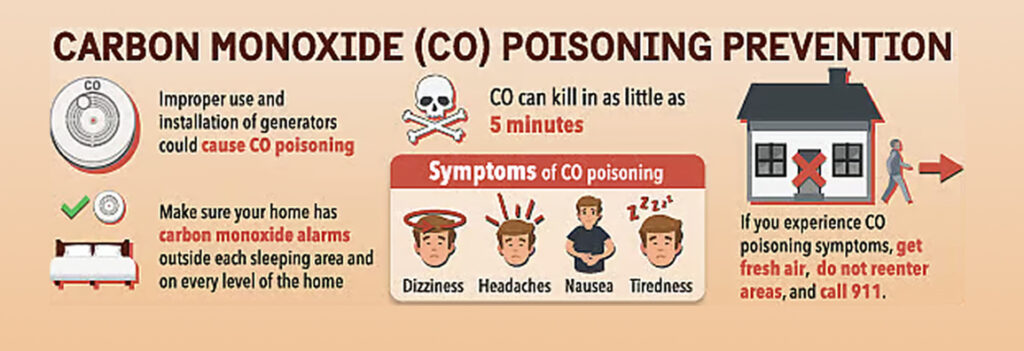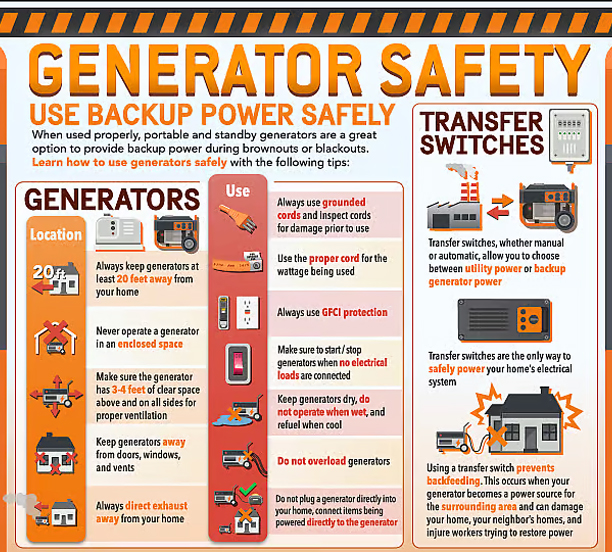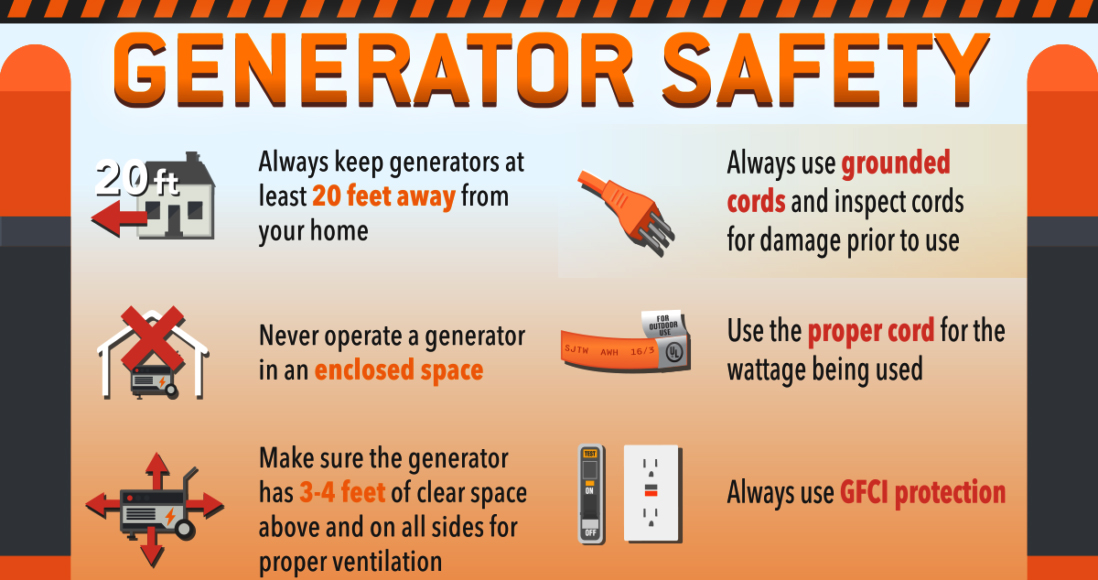Portable generators are essential devices that convert mechanical energy from internal combustion engines into electrical power, providing a reliable solution when the primary electricity supply is unavailable. Commonly used in emergency situations, such as during power outages caused by hurricanes, tornadoes, or other natural disasters, they are also ideal for remote locations where electricity access is limited. These machines are valuable for running essential appliances and tools during recovery and cleanup efforts. However, despite their benefits, portable generators can pose significant health and safety risks, including carbon monoxide poisoning, fire hazards, and electrical shock. Understanding proper usage is crucial for safe operation.
Be Aware of Hazards When Using A Generator at Home
- Carbon monoxide from a generator’s exhaust.
- Shocks and electrocution from improper use of power or accidentally energizing other electrical systems.
- Fires from improperly refueling a generator or inappropriately storing the fuel for a generator.
- Noise and vibration hazards.
Safety Tips
Be sure to read the manufacturer’s instructions on how to use the generator.
Carbon monoxide poisoning

- Do not assume that you are safe. Carbon monoxide from generators is completely colorless and odorless, so you won’t know if it’s there. It could kill your family and your pets.
- Do not use a generator indoors or in partially enclosed spaces- including homes, garages, and crawl spaces – even those areas with partial ventilation.
- Do not operate near open doors and windows. Using fans will not prevent carbon monoxide build-up in the home.
- Install battery-powered carbon monoxide alarms inside your home to alert you of dangerous levels. Be sure to follow the manufacturer’s recommended placement.
Electrocution or electric shock
- Always connect the generator to appliances with heavy-duty extension cords.
- Hooking up your generator directly into your home power supply could increase the voltage or could cause a surge to the outside power lines and potentially injure or electrocute an unaware utility lineman. It also bypasses some of the built-in household circuit protection devices. Connecting the generator to your home could cause a surge in electricity that might result in injury or death to yourself or your family.
- Use a qualified electrician to install the appropriate equipment in accordance with local electrical codes or ask your utility company to install an appropriate power transfer switch.
Fire
- Keep your generator outside and fuel your generator outside.
- Do not store fuel for your generator in your house. Gasoline, propane, kerosene, diesel and other flammable liquids should be stored outside living areas in properly labeled, non-glass safety containers.
- Do not store fuel near a fuel-burning appliance, for example a gas stove.
- If the fuel is spilled or the container is not sealed properly, invisible vapors from the fuel can travel along the ground and be ignited by the appliance’s pilot light or by arcs from electric switches.
- Before refueling the generator, turn it off and let it cool down. Gasoline or other flammable liquids spilled on hot engine parts could ignite, and invisible vapors from the fuel can travel along the ground and be ignited by the generator’s pilot light or by arcs from electric switches in the appliance.
Noise and Vibration Hazards
- Generator engines vibrate and create noise. Excessive noise and vibration could cause hearing loss and fatigue that may affect job performance.
- Keep portable generators as far away as possible from work areas and gathering spaces.
- Wear hearing protection if this is not possible.

Stay Informed & Be Safe
Portable generators are invaluable during emergencies or power outages, providing temporary electricity when it’s needed most. However, their use comes with significant health and safety risks, including carbon monoxide poisoning, electrical hazards, and fire dangers. By following proper safety guidelines and using them responsibly, you can harness the benefits of portable generators while protecting yourself, your family, and your home from potential dangers. Stay informed, stay safe, and always prioritize safety when using a generator.






